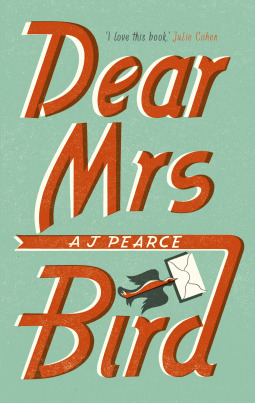 About the Book
About the Book
London, 1940. Emmeline Lake is Doing Her Bit for the war effort, volunteering as a telephone operator with the Auxiliary Fire Services. When Emmy sees an advertisement for a job at the London Evening Chronicle, her dreams of becoming a Lady War Correspondent suddenly seem achievable. But the job turns out to be working as a typist for the fierce and renowned advice columnist, Henrietta Bird. Emmy is disappointed, but gamely bucks up and buckles down.
Mrs. Bird is very clear: letters containing any Unpleasantness must go straight in the bin. But when Emmy reads poignant notes from women who may have Gone Too Far with the wrong men, or who can’t bear to let their children be evacuated, she is unable to resist responding. As the German planes make their nightly raids, and London picks up the smouldering pieces each morning, Emmy secretly begins to write back to the readers who have poured out their troubles.
Format: ebook, hardcover (320 pp.) Publisher: Picador Books
Published: 5th April 2018 Genre: Historical Fiction
Pre-order/Purchase Links*
Amazon.co.uk ǀ Amazon.com ǀ Hive.co.uk (supporting UK bookshops)
*links provided for convenience, not as part of any affiliate programme
Find Dear Mrs. Bird on Goodreads
My Review
Dear Mrs. Bird opens in a jolly, lively style full of ‘chin up’ and ‘stiff upper lip’ spirit – a spirit of which the domineering (and let’s be honest, quite frightful) Mrs. Henrietta Bird would be proud. As far as Mrs. Bird is concerned, any problem can be resolved by showing the right amount of grit and by Not Giving In.
However, beneath the spirit of ‘Keep Calm and Carry On’, the book demonstrates through the letters sent to Woman’s Friend magazine, the impact of war on people’s personal lives. ‘Women whose worlds had been turned upside down by war, who missed their husbands, or got lonely and fell in love with the wrong man Or who were just young and naïve and had their heads turned in a trying time.’ Not just the constant air raids and the rationing but the displacement, separation and life plans changed – engagements, marriages, even conceptions delayed or brought forward – because who knows what tomorrow will bring or if there will even be one?
Emmy’s friendship with Bunty is what helps her get through the days – that and the occasional luxury of a Garibaldi biscuit, a fig roll or a bath in more than an inch of lukewarm water. But as events unfold, that friendship will be tested.
The reader is transported to a time when people still wrote letters and used them to express their feelings. As Emmy notes, ‘I could see people were ever so frank when they wrote in, which I thought was quite brave.’ The importance of letters to those serving away from home comes across clearly, providing those receiving them with details of ‘normal life’ to which they can cling; a reminder of what they are fighting for.
The resilience shown by Emmy, her friends and work colleagues reminds us of the courage and fortitude of the people of London during the blitz. ‘Mother always worried about how we kept going. I had no idea. We just did.’ Oh, and the often underappreciated role of tea in sustaining the war effort.
Humour played a key role in maintaining morale and there are some very funny bits in the book, such as Bunty’s and Emmy’s plan to use the hideous globe-shaped drinks cabinet bequeathed to them by Bunty’s grandmother as an offensive weapon. ‘Bunty and I had decided that if the Germans invaded London and broke in, we would push it down the stairs at them. The full extent of the British Empire was featured in a rather confident orange and we thought that would make them wonderfully cross.’
Dear Mrs. Bird also acts as a reminder of the important role played by women in World War 2 – manning fire station telephones (like Emmy), acting as dispatch riders and couriers, serving in the Women’s Voluntary Service, Red Cross, Land Army and so much more. And that constant danger wasn’t only faced by those serving on the front line but also by men who served in the Fire Service and Bomb Disposal on the home front.
As the book progresses, the tone changes and darkness comes, showing the true costs of war, the horrors of the blitz (‘noise was coming from everywhere at once, as if we were being eaten by the very sound itself’) and the fact that sometimes ‘carrying on’ just isn’t enough. ‘Stiff upper lips and getting on with things were all very well, but sometimes there was nothing to do but admit that things were quite simply awful. War was foul and appalling and unfair.’
This makes it sound like Dear Mrs. Bird is a depressing book; far from it. It is funny, charming and heart-warming. The narrative voice sets the tone of the book delightfully: ‘The sun had pulled its socks up and was making a good effort in the almost cloudless winter sky’. However, I liked that the author wasn’t afraid to feature darker moments amongst the light-hearted elements (because, of course, the cloudless winter sky just mentioned would be a gift to the Luftwaffe bombers.)
I received an advance reader copy courtesy of NetGalley and publishers, Picador, in return for an honest and unbiased review.
In three words: Spirited, compassionate, touching
Try something similar…The Chilbury Ladies’ Choir by Jennifer Ryan
 About the Author
About the Author
AJ Pearce grew up in Hampshire and studied at the University of Sussex. A chance discovery of a 1939 women’s magazine became the inspiration for her ever-growing collection and her first novel Dear Mrs Bird. She now lives and writes in the south of England.
Connect with AJ Pearce
Publisher website ǀ Facebook ǀ Twitter ǀ Goodreads


Your review has made me even more pleased that my request to review was granted from NetGalley. It sounds wonderful.
LikeLiked by 1 person
Lovely, hope you enjoy it.
LikeLiked by 1 person
Fab review! Hoping I can approved for this one on NG!
LikeLiked by 1 person
Fingers crossed! (And chin up, if you don’t, lol)
LikeLiked by 1 person
😂
LikeLike
Definitely getting a copy now!
LikeLiked by 1 person
Great review, I’m hoping to read this one next week xx
LikeLiked by 1 person
Hope you enjoy it
LikeLiked by 1 person
sounds fab! definitely need to pick this up!
LikeLiked by 1 person
Lovely review!
LikeLiked by 1 person
Thank you 😀
LikeLike
I loved this book!
LikeLiked by 1 person
This is in my queue. Can’t wait to read it now!
LikeLiked by 2 people
Great, hope you enjoy it 😀
LikeLiked by 1 person
Funny and charming? This does sound good. Thanks!
LikeLiked by 2 people